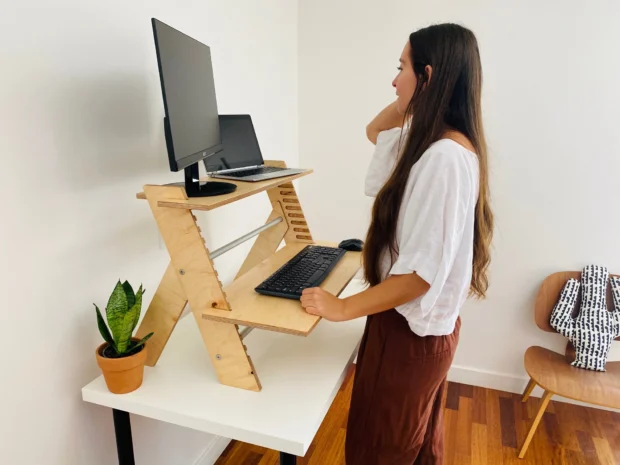Everyone knows sitting all day is bad for your health, but standing at your desk for hours each day is just as unhealthy for your body. Although standing may seem like a healthier way to work, an Australian study published last year found otherwise.
Standing desks are a popular way to counter the negative effects of sitting. Not only do they allow you to work more at your computer, but they can also reduce your risk of heart disease, diabetes, and early death. A standing desk takes up much less room than one that is used in a chair, and can even increase your productivity. But is it safe to use a standing desk?
In recent years we have seen dramatic changes in the world of work, especially during pandemics when most people are forced to work from home. The use of a standing desk is one of the new changes, as it provides the workers with the necessary comfort and, above all, promotes good health.Is a standing desk useful for you?
Many people are starting to use standing desks. And since sitting is the new smoking, there are many standing desk brands on the market today. And each brand promises to be better than the other. But is a standing desk really better than a traditional desk? There is so much noise at the moment that much of it is even false. To capitalize on the healthy lifestyle people are adopting, manufacturers are making bold claims.
That’s why we help you disentangle these claims and myths. So we’re going to answer that question right at the beginning. Yes, a standing desk can be good for you. But to what extent? And are these claims true? Let’s take a look below.
claim 1: Standing desks can help you lose weight
You know the claim that standing desks can replace a brisk walk or even exercise. Since you burn more calories standing than sitting, that should be enough, right? Well, not exactly. This is our opinion.
To burn fat, you need to increase your heart rate. Let’s say you feel your heart rate increase when you run or walk. And you have to keep this up for a period of time to burn fat.
That means you get a break too. And you’ll sweat. Do you feel it when you just stand there? Not a big one. Although we burn more calories standing than sitting, this is not significant enough to cause even minimal weight loss. There is very little difference in the number of calories burned when sitting and standing. A standing desk will not help you lose weight. You really need to practice. This means moving, increasing your heart rate and sweating.
Claim 2: Workstations reduce stress and anxiety

Not a big one. Some jobs require you to stand all day. Do they feel less stressed? No way. On the contrary, her legs are too tired and too tense. Standing all day is not necessarily better than sitting all day. Try standing for at least a day and you’ll get sore feet, foot problems and even back pain. The same goes for sitting during the day. So using a standing desk does not directly lead to less stress. But you know what would help? Moving. Our bodies are designed to move.
When you sit all day, your body feels sluggish and tense. If you stand all day, your body will also feel tired and stressed. The bottom line is that you need to move. You can’t stay in the same position all day. Alternating between sitting and standing is the best solution. It can help relieve fatigue and stress. Don’t just sit there, don’t just sit there.
Claim 3: Standing desks can help you be more productive
It’s very subjective. And whether you are productive or not depends on the person, not whether you are sitting or standing. You can stay up all day and not do much. And you can sit around all day and do a lot of things. The same applies in the opposite direction. So it’s all a matter of mentality. However, if this is your first time using a standing desk, it’s best to steer clear. But this fleeting feeling fades as my legs tire and the pain radiates down my back.
The same thing happens if you have just installed a new table, even if it is a traditional table. Or you just bought a new ergonomic chair. The excitement of using something new encourages you to do more. This is what allows you to be productive to begin with. But to keep up this pace, you need to do more than just use a standing desk.
Requirement No. 4: Standing desks can help correct poor posture
Others consider the use of standing desks to be the best solution to correct poor posture. If you tend to be constantly hunched over in your office chair, a desk switch may be a good idea. But not really. You can strike a bad pose even while standing. And even if you walk, your shoulder may still be blocked.
When your legs are tired, you also tend to transfer all your weight to your arms and lean on the table with them. This will make your shoulders roll. So no, by itself, it doesn’t help with posture problems. What helps you correct bad posture is regular exercise and mindfulness. You have to make sure you don’t neglect yourself in everything you do.
Requirement No. 5: Standing at the table reduces the incidence of diabetes, obesity and other lifestyle diseases
When we talk about lifestyle diseases, you have to fight these diseases by changing your lifestyle. Using a standing desk alone will not change your lifestyle. You should also exercise regularly.
You need to eat more consciously and healthily. You also need to have a positive attitude and get rid of all negative energy. And, of course, you should be happy. While using a standing desk can help you in this area, it will only be effective if you combine it with other measures. Preventing diseases of civilization involves much more than just a less sedentary lifestyle. You can stay up all day and still eat chips and drink soda.
Does this mean standing desks are just a fad?
The above claims are indeed far-fetched. And as we said earlier, manufacturers are benefiting from the fact that people are becoming more health conscious. However, a standing desk alone will not help you achieve the results discussed above. But there are still benefits to using it. First, as mentioned earlier, standing desks are an aid to alternate sitting and standing.
If you only use a traditional desk, you cannot use it for standing work. The bar tables are more functional. An alternating sitting and standing position is best for us. If your legs are tired, you can sit down. And if you feel you need to move a bit to regain some energy, you can stand up.
Second, bar tables have a number of features that traditional tables do not. You can not only switch between sitting and standing, but also use a number of handy functions. Some bar tables are equipped with an anti-collision function. The table stops when it touches something. For others, it’s a reminder to sit down
. The device gives an alarm if you sit too long. Some even have Bluetooth, and you can even charge your phone on the countertop. Third: Bar tables give a more modern and updated look. Premium standing desks are beautiful and stylish, and can compete with any traditional desk. And fourth: That sounds cool. It’s really cool to have a table that can go up and down. There are many options on the market and you will have a hard time choosing one.
So, is it worth it?
It’s worth it if you learn to manage your expectations. And don’t get caught up in marketing strategies that drive up the price of the table and turn it into a mere piece of equipment. A standing desk is only worthwhile if it is of great benefit to you. So you have to weigh the cost against the benefits and features of a standing desk. So the answer is that it depends on the situation. It can’t help 100% to prevent civilizational diseases, but it can help a little. It won’t help you lose weight or relieve stress, but it can change the way you look at your work. It can brighten up the atmosphere in the office. So the key is to take everything with a grain of salt. Bar tables may not be the total solution, but they can be part of the problem. You just have to know how to use it to your advantage. And of course, a positive attitude will help you do that. So don’t blame your traditional office for your lack of productivity today, haha!
Good reasons why using a standing desk is beneficial
Standing has several health benefits and reduces the risks of prolonged sitting. However, a recent study shows that standing desks are unlikely to prevent weight gain or loss. Health experts who advocate standing desks cite studies showing that standing more helps bring blood sugar back to normal after a meal. They also cite evidence that standing reduces the risk of back and shoulder pain and prevents depression. Some of the other potential health benefits of standing desks are based on the fact that prolonged sitting is recommended for prevention purposes. These health benefits include prevention:
- Diabetes
- Obesity
- Cancer (especially breast or colon cancer)
- Cardiovascular diseases
- premature death
However, it is important to understand that reducing prolonged sitting does not only mean standing, but also walking, moving or just standing. Recent research on energy expenditure has shown that these activities can lead to different health outcomes. The actual health effects of using a standing desk cannot be determined with certainty against the background of these potential benefits, as comprehensive studies have not yet been conducted. On the other hand, if you are considering standing at your desk, you should be aware that standing desks, like other measures, have their side effects. You risk z. B. Pain in the legs, back or feet when you decide to suddenly move from a sitting to a standing position. It is recommended to start with 30-60 minutes and then gradually increase the amount of time you stand until you feel comfortable. This mainly depends on the tasks you are performing, as some functions can be performed well sitting down. Therefore, a standing desk is not always comfortable for all people who spend most of their time at a desk.
5 mistakes people make when using a standing desk
Using a standing desk is a great way to counter the effects of a sedentary lifestyle that increases health risks. But despite the importance of a standing desk in reducing health risks, there are some mistakes that can do more harm than good. Some of these errors are:
Spend the whole day at a standing desk
Standing for a few hours at work is preferable to spending all your working hours sitting down, but standing all day can also lead to a number of health problems. Therefore, a standing desk is recommended to reduce the health problems associated with long periods of sitting.
Standing all day, however, is not good for your body. On the contrary, it creates new risk factors that will be even more detrimental to your health. For example, prolonged standing can lead to problems with the lower back and spine. It can also increase the risk of deep vein thrombosis, varicose veins and other cardiovascular problems. Standing for too long forces your heart to work against gravity to keep blood flowing to your lower extremities.
A 2017 study of 7,000 participants published in the American Journal of Epidemiology provides ample evidence of the risks associated with standing too long. The study found that people who spend most of their time standing are twice as likely to develop heart disease as those who spend most of their time sitting. However, the author concluded that the combination of standing and sitting has many health benefits. It is also recommended that you move from standing to sitting throughout the day and stretch often.
Using a standing desk for incorrect tasks
As mentioned earlier, some tasks are better done sitting than standing at a desk. Most of the time, these are jobs that require motor skills because our brains can perform them better in that position. So there’s a reason why we write more easily when seated, and also why we drive more easily when seated. Sitting allows the brain to function properly because it can process information evenly. On the other hand, do these tasks standing up as you will be forced to multi-task. This means you don’t have to throw everything away, as we have great chairs designed specifically for these needs. Also, if your work requires prolonged concentration, it may be wise to avoid warnings that tell you when to get up, sit down or move around. It takes about 25 minutes for your brain to regain its concentration after these breaks. Letting your body decide when to stand up or sit down can help you stay focused.
They remain silent for a long time
It is common to attribute all the dangers of a sedentary lifestyle to sitting in a regular chair, because most studies are based on the time people spend sitting, not on how still they sit. According to Ken Tameling, seating expert at Steelcase Furniture Company, the frequency of your movements is more important than whether you’re sitting or standing. This means that you need to stretch and walk to maintain your health. However, physical activity doesn’t necessarily mean you need a desk with a treadmill that interferes with attention and disrupts studying and typing. Instead, find simple and effective ways to exercise while standing or sitting. If you use a standing table, you can relieve your legs by alternating them with a footrest. To do this, bend over so that your upper body and legs form an angle of 135 degrees, which is the healthiest sitting position. Research has shown that any form of micro-movement can have beneficial effects on your body’s health. The worst thing you can do with a standing desk is to stand still for long periods of time.
Excessive expenditure on the purchase of a standing desk
A standing desk is important to reduce the problems associated with frequent sitting. However, this does not have to mean that you have to spend a lot of money for this purchase. For example, you can buy a comfortable standing desk at an affordable price and adapt an ordinary desk to his needs. For example, by placing the computer on top of an object or a stack of books. Standing doesn’t have to be expensive either, especially for tasks you need to do while seated. This means that before you spend money on a fancy table, you should try some simple solutions first.
Use of a weight-reduction bar table
Another mistake people make when using a standing desk is that they do it to lose weight. Several studies have shown that their use is unlikely to produce the desired results. A 2017 study found that if you stand for six hours a day, you can burn 50 more calories than your body burns when you sit. However, it is important to exercise for 20 to 30 minutes to reduce health risks.
Baseline
In general, standing desks work for you, but they may not be the ultimate solution for a sedentary lifestyle. Also, like regular desks and other inventions, they can pose health risks, especially if used during the day or for the wrong tasks. However, the use of a standing desk helps to reduce sitting, although it is preferable to use other solutions that allow for more physical activity. These include walking, cycling, stretching and exercises at work or at home.
Frequently Asked Questions
How long should you stand at a standing desk?
Standing desks are pretty popular because they promise to be a healthy and efficient way to work. But how long should you stand at one? The answer depends on your health, body type, and the tasks you do. As of right now, the best advice on how long to stand at a standing desk is don’t stand for more than one hour at a time, and don’t stand for longer than two hours at a sitting desk.
Is it bad to use a standing desk all day?
Standing desk is a hot commodity right now, with many standing desks and standing desk accessories being sold. The theory goes that standing up or sitting down less throughout the day will help you burn more calories and lose weight. But is it true? And, if so, which standing desk should you buy? We tested two standing desks and found that they both do indeed burn calories, but in different ways. We also found that both have pros and cons.
A standing desk is a great way to save time, reduce back pain, and improve your workday experience. However, what if you sit all day at work? Would you be better off using a standing desk for your whole day? Maybe, but that depends on the type of work you do.
What are the benefits of a standing desk?
Standing has been shown to improve circulation, improve posture, reduce the risk of heart disease, and reduce back problems. But what about standing desks? Do they actually help, and if so, how? Today, sitting is the biggest cause of weight gain. Most overweight people report that they sit a lot, and even more people who suffer from back pain say that sitting all day in the office brought them to their health condition. In a study conducted by Harvard Medical School, participants who spent most of their workday sitting were more likely to develop glucose intolerance and type 2 diabetes, than their colleagues who worked in other positions.




